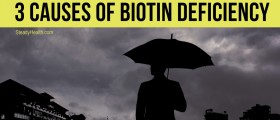
Vitamin A Deficiency Shows Up As Reduced Ability to See
Vitamin A has several jobs in the body: it's important for good vision, for the immune system and for growth and development. Vitamin A is needed for the part of the eye that controls vision in low-light conditions, so one of the first symptoms of Vitamin A deficiency is night blindness. If the deficiency is severe enough it can result in complete blindness. In its role as a key factor in the immune system Vitamin A can also have a vital role in protecting against disease and even subclinical deficiency can be implicated in a greater risk of contraction of and death from infectious diseases. Vitamin A is mostly found as retinol in animal foods and as carotenes - the substances that dye carrots orange - in plant foods. For adults, the recommended intake of Vitamin A is 900 micrograms a day for men and 700 for women and the upper recommended limit is 2800 micrograms.
- Important notification about information and brand names used in this slideshow!
- Photo courtesy of Martin Cathrae by Flickr : www.flickr.com/photos/suckamc/6193774496/
- www.dummies.com/how-to/content/signs-of-vitamin-deficiencies-in-your-diet.html
- http://www.details.com/blogs/daily-details/2013/04/5-weird-signs-youre-vitamin-deficient.html
- http://www.nlm.nih.gov/medlineplus/ency/article/002596.htm
- http://en.wikipedia.org/wiki/Vitamin_poisoning
- http://www.webmd.com/food-recipes/features/effects-of-taking-too-many-vitamins

Vitamin E Overdose Can Manifest As Vitamin K Deficiency and May Be Related to Cancer
Excess Vitamin E can act as an anticoagulant, resulting in poor blood clotting, and consequently causing bleeding problems. It can also interfere with the absorption of Vitamin K, causing a Vitamin K deficiency, and if combined with aspirin very high doses of Vitamin E can be lethal. However, the dose at which Vitamin E becomes dangerous is 1, 000 mg a day - very much higher than the recommended intake and attainable only through massive supplementation. During the course of research intended to discover the health benefits of supplementation with high doses of Vitamin E it has emerged that high Vitamin E intake may have a chronic effect, contributing to age-related macular degeneration and prostate cancer, though this is very unclear.
- Important notification about information and brand names used in this slideshow!
- Photo courtesy of Mynde Mayfield by Flickr : www.flickr.com/photos/myndemayfield/7487241530/
- vitaminaoverdose.net/

Vitamin C Deficiency Symptoms Can Include Scurvy
Vitamin C is an antioxidant whose main role is to protect the body's tissues from oxidative stress. It also has a role in making and repairing collagen. Shortage of Vitamin C at its most severe results in scurvy, a breakdown of the body's tissues and eventually the loss of teeth and bleeding from the mucous membranes. It can cause death if untreated but the treatment is simple, and Vitamin C is found in high concentrations in many plant foods, especially citrus fruits, and organ meats. The typical dietary recommendation for adults is a minimum of 90 milligrams a day and a maximum of 2, 000 milligrams a day.
- Important notification about information and brand names used in this slideshow!
- Photo courtesy of troye owens by Flickr : www.flickr.com/photos/troye/2216653823/

Vitamin E Deficiency Shows Up As Anemia and Loss of Reflexes
Vitamin E stops the production of reactive oxygen species - free radicals - when fat is metabolized. Since ROS cause oxidative stress that actually damages the body's tissues Vitamin E is important and good sources include vegetable fats such as margarine and wheat germ oil. Vitamin E deficiency is almost unknown from dietary issues, instead resulting from rare genetic disorders or in very low birth weight babies. Its symptoms include neuromuscular problems including absence of deep tendon reflexes and loss of proprioception, as well as sometimes causing anemia by failing to protect red blood cells form oxidative stress. The recommended intake of Vitamin E is 14 milligrams a day.

Vitamin K Overdose Is Almost Unknown But a Synthetic Version Can Cause Dangerous Anemia
Vitamin K overdose is more or less unknown outside of allergic reactions in rare cases and the danger caused to potential stroke victims by its coagulant properties working properly. Studies in humans using doses as high as 135mg a day - about a thousand times higher than the recommended amount - resulted in no increase in the risk of dangerous blood clots. However, a synthetic form of Vitamin K, K3 or Menadione, is toxic and has been banned for over the counter sale in the USA because high doses can case liver cells to die and trigger allergic reactions and hemolytic anemia, in which the red blood cells are broken down.
- Important notification about information and brand names used in this slideshow!
- Photo courtesy of Mattias by Flickr : www.flickr.com/photos/mnsc/2768392379/

Vitamin A Overdose Symptoms Can Include Nausea and Vomiting
Vitamin A overdose is a particular danger for pregnant women, who are therefore advised not to eat liver, which is a rich source of Vitamin A. Vitamin A is stored in the human liver too and overdose occurs when the liver's ability to store it is exceeded, and the excess enters the bloodstream. Chronic symptoms include coarse bone growth, excessive skin dryness, hair loss, intercranial hypertension (high blood pressure in the brain) and reduced bone mineral density. Acute overdose causes nausea and vomiting, headaches, dizziness and loss of coordination. Since these symptoms can be hard to pick apart on your own and Vitamin A overdose isn't the first thing you'd think of, it;s usually picked up on during medical examination.
- Important notification about information and brand names used in this slideshow!
- Photo courtesy of Alena Navarro- Whyte by Flickr : www.flickr.com/photos/lenifuzhead/109888893/

Vitamin C Overdose is Rare But Can Be Dangerous
Vitamin C overdose is not easy to attain and most people are somewhat deficient in Vitamin C; one criticism of the levels recommended is that they are set at a level required to prevent scurvy rather than to maintain optimal health. Vitamin C can cause diarrhea if too much is taken, though the does needs to be very high; some proponents of orthocular medicine claim that the dose a person requires is just below that which trigger diarrhea rather than just above that which prevents scurvy, though this is disputed by the majority of the medical profession. Vitamin C is acidic - so much so that it is used as a preservative in foodstuffs under its chemical name, Ascorbic Acid - and high doses can cause heartburn and indigestion. Megadoses hundreds of times higher than the recommended intake cause flushing of the face, trouble sleeping, headaches, vomiting, and diarrhea.
- Important notification about information and brand names used in this slideshow!
- Photo courtesy of William Andrus by Flickr : www.flickr.com/photos/wandrus/7088119483/

Vitamin D Overdose Symptoms Are Rare and Include Renal Failure
Vitamin D overdose symptoms include anorexia, vomiting, nausea, and in severe cases, renal failure. Fortunately it is very rare and all known cases have been the result of massively excessive Vitamin D supplementation. The mechanism by which Vitamin D is toxic is hypercalcemia - an excess of calcium in the blood, which is deposited in organs and tissues instead of in bones where it belongs. The dose at which Vitamin D begins to become dangerous is a sustained intake of more than 1, 250 micrograms daily for several weeks, in adults, although lower doses are dangerous in children and fetuses and pregnant women are advised to consult a doctor before taking Vitamin D supplements.
- Important notification about information and brand names used in this slideshow!
- Photo courtesy of anyjazz65 by Flickr : www.flickr.com/photos/49024304@N00/3761634093/

Vitamin K Deficiency Results in Bleeding Troubles
Vitamin K is not a single substance but a group of related substances identified by their activities rather than their identities - by what they do rather than what they are. Vitamin K is needed for blood clotting and aids in wound healing and plays a role in the metabolic pathways by which nutrients are shipped about the body at the molecular level. The most obvious symptom of Vitamin K deficiency is poor blood clotting, and in fact this is deliberately induced clinically by drugs like warfarin which achieve their anticoagulent effects by suppressing Vitamin K in the blood. Extreme Vitamin K deficiency is recognized by cartilage calcification and calcium deposits on the walls of blood vessels, birth defect in children and a risk of massive uncontrolled bleeding. The recommended daily intake of Vitamin K is 120 micrograms a day for adult men and 90 micrograms a day for adult women.
- Important notification about information and brand names used in this slideshow!
- Photo courtesy of Mattia Belletti by Flickr : www.flickr.com/photos/redglow/318121819/

Vitamin D Deficiency Symptoms Were Once Familiar, and Include Rickets
Vitamin D is required to absorb calcium and phosphates from the diet, and consequently a deficiency leads in the long term to bone problems including osteoporosis and rickets, in which the bones become soft and bend. Vitamin D can be synthesized by human beings exposed to sunlight, or you can get it from a diet rich in milk, since milk has been fortified with Vitamin D since the 1930s to prevent rickets, or animal foods generally including meat, fish and eggs. Deficiency symptoms at a less severe level include muscle aches and weakness and muscle twitching. The recommended intake of Vitamin D for adults is dependent on skin melanin and exposure to sunlight but a level in the blood of 76 nanograms per liter of blood or less is considered a deficiency.
- Important notification about information and brand names used in this slideshow!
- Photo courtesy of Jeremy Noble by Flickr : www.flickr.com/photos/uberculture/3520819232/


























Your thoughts on this
Loading...